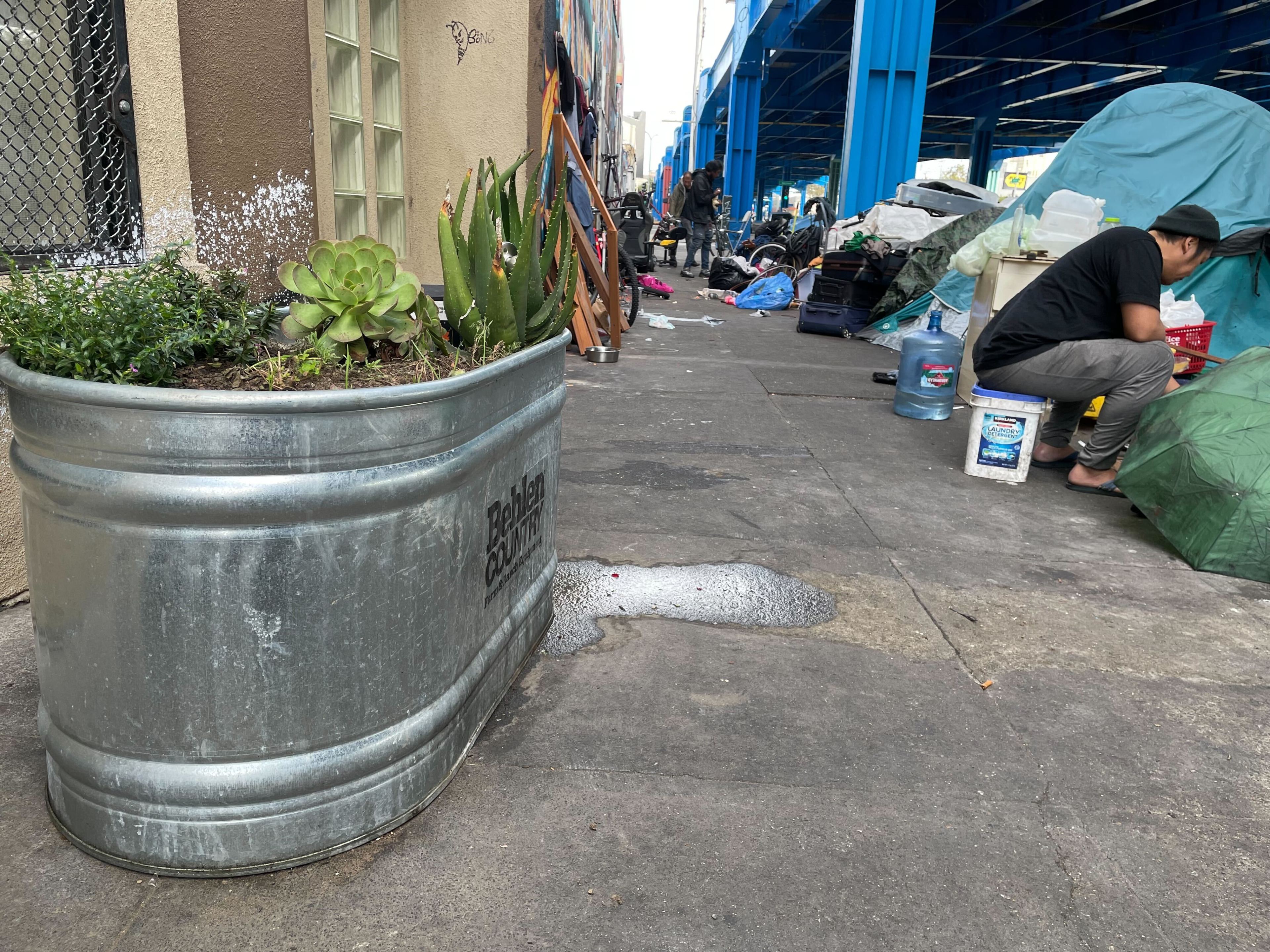Along San Francisco’s sidewalks, outdoor planters are becoming an ever more ubiquitous sight. But while some say they are just meant to beautify neighborhoods, others claim they are just the “latest fad” in designs meant to shuffle homeless people around the city without addressing homelessness itself.
“They’re trying to zone us out,” said Josh Banez, who lives in an encampment at 13th and Isis streets. The sidewalk where Banez lives has 13 outdoor planters clustered together.
“It makes me angry,” he said. “Like, can’t you just talk to us?”
Banez said that rather than blocking the sidewalk to stop encampments forming, providing them with trash cans and bathroom access would help them better keep the sidewalk clean.
“It’d be better if they’d just work with us,” he added.
Ray Rosal, who also lives in the encampment, said the planters, along with a fence around a pole supporting the Central Freeway, appeared three weeks ago and displaced two tents and their residents, although he doesn’t know where they went.
“I don’t really care,” Rosal said. “They’re going to block the street, I understand. It’s their business.”
Genner Barrios’ truck was badly burned, along with at least five other vehicles, from an encampment fire on Stevenson Street near 14th Street. Barrios, who lives near where the fire happened, said he supports having planters block off encampments.
“I think it’s better to keep the area clean in case something happens,” Barrios said.
Noah Coombs, who lives in the Outer Mission, said while he’s sensitive to issues faced by people on their block due to encampments—including fire risks—he thinks there needs to be more action by the city to end homelessness.
“We can think through better solutions,” Coombs said. “We shouldn’t just move them along.”
The San Francisco Fire Department said on X it is investigating the encampment fire.
‘Hostile Architecture’
Kelley Cutler, a former organizer with the Coalition on Homelessness, said the planters just shuffle homeless people around without actually addressing the root causes of homelessness.
“They’re popping up everywhere,” she said. “It seems to be the latest fad in hostile architecture. If the same effort was meant to help these folks, you could see them getting housed.”
Cutler pointed out that without regular upkeep, the planters would become “metal tins collecting trash.”
SF Planters, an organization that facilitates San Francisco deliveries of the planters, advertises them as “beautiful and vibrant” and boasts that the ones spotted around the city weigh more than 1,000 pounds when filled with plants and soil. But it makes no mention of them as an anti-homeless tactic.
On its website, SF Planters says it works with businesses, homeowners or those “who just want to improve their neighborhood.”
San Francisco’s Department of Public Works said the planters do not need permits, as long as people can walk along the sidewalk.
“Our primary concern is that they do not impede an accessible path of travel,” Public Works spokesperson Rachel Gordon said.
Transportation advocate Scott Feeney countered that the planters violate city codes, pointing to a Public Works order that states that planters more than 36 inches high and across need permits, as do planters that are permanently affixed to the sidewalk.
“The city is trying to build tiny homes at 16th and Mission [streets], and those require permits,” Feeney said. “The city is slowing down housing, but expediting things that shuffle people from block to block.”
Nebraska Planters
Many of the planters spotted around San Francisco bear Behlen Country-branding. The planters are made by Behlen MFG, a Columbus, Nebraska-based manufacturing firm that owns Behlen Country. The company's headquarters is 1,599 miles away from San Francisco.
Rick Smith, a regional sales manager for a popular planter brand, Behlen Country, said he wasn’t aware of the reported tactic of using planters to block encampments from forming on the sidewalk.
Smith said that despite the proliferation of outdoor planters, sales have decreased overall since the height of their popularity during the pandemic.
“Back then, everyone was trying to grow their own food, and there were a lot of restaurants going outdoors,” Smith said.
Smith said San Francisco likely makes up a very small percentage of total sales, with most being sold for agricultural use and livestock.
“They’re primarily for animal use,” Smith said. “The majority of them are sold in the country for livestock.”
Behlen MFG did not respond to requests for comment. Neither did SF Planters founder Cody Cunnington.
